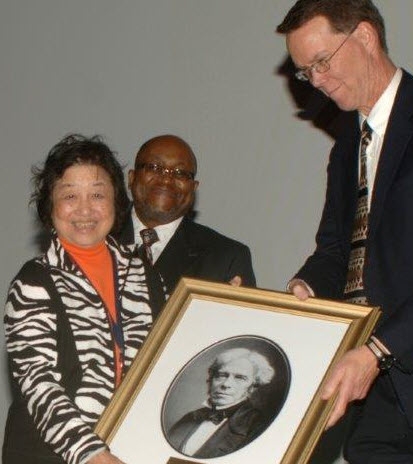May262016
Posted at 12:19 PM
Ed. note: This post is part of the Spotlight on Commerce series highlighting members of the Department of Commerce and their contributions to the Open for Business Agenda
Last December, with 48 years of service at NIST, I was honored to be recognized as the “Dean of Staff”—the longest-serving current employee. This recognition has me reflecting back on my career and the importance of taking advantage of every opportunity. Which I think is also a good message for Asian Pacific American Heritage Month, which celebrates the many people who have seized opportunities and made countless contributions to the United States.
As a computer scientist for my entire tenure with NIST, my key responsibility has been to perform research, analysis, and evaluation of innovative information technology software and practice with emphasis on new fields of computer technology for federal government applications.
I was born in Hangzhou, one of the largest coastal cities in Eastern China. I grew up in Shanghai, and just before China became a People’s Republic in 1949, my family moved to Hong Kong, which, at that time, was a British colony. I went to an English-speaking all-girls high school, where I learned to be bi-lingual in both Chinese and English.
I was the oldest of five sisters and a brother. I grew up in a fun-loving family with a lot of music, fashion, and art, but, as in most Chinese families, we always placed education first.
I soon came to the United States to study liberal arts at New York University. As a freshman, I was asked to take two mandatory courses: American history and correction of foreign accent, not my Chinese accent but my British accent.
During my sophomore year, I enrolled in a new course called “Digital Computer Programming,” taught by Daniel McCracken, and that was the best math course I ever took. After I graduated from NYU’s Courant Institute of Mathematical Sciences with a major in mathematics and minor in physics, I started as a computer programmer at Bell Telephone Laboratories in New Jersey. I was soon married to Jeffrey Fong, who was then a graduate student at Columbia University. We both decided to go to Stanford for further graduate studies.
At Stanford, instead of taking more math classes, I started taking computer science courses that included artificial intelligence and a programming language called LISP.
After Jeffrey received his Ph.D. at Stanford, he was offered a postdoctoral fellowship at NIST (then the National Bureau of Standards, or, NBS). I, short of a thesis, followed him to Gaithersburg, Md. Planning to take a break to add to our family with a second child, I was not actively seeking work until I got a call from Ethel Marden, then chief of NBS’s Computer Systems Division. She insisted that I come to NBS, which had just initiated a project using LISP. So I started working again in 1967, when our second child was only 6 weeks old. I was the fourth woman to join the program.
I quickly moved onto bigger projects, as there were only a few people at NBS who knew LISP. In the 1970’s, the new field of technology was how to manage data. The U.S. government was a big consumer of these expensive and proprietary technologies. To help make sense of this emerging market, NIST was charged with building consensus around common approaches in order to simplify procurements. Our work led to the birth of the Structured Query Language (SQL), which later became an international standard for accessing databases.
I greatly benefited from the visionary leadership of NIST and I continue to love my job. My current work involves research in software assurance tools. We start with a specification that lists a set of minimum functionalities that allow us to understand how tools behave in software testing. Today, I believe the static analysis tools are far more sophisticated, from dealing with shallow syntactic features to detecting bugs and vulnerabilities based on a deeper semantic analysis of the program, using control and dataflow techniques.
I now have opportunities to work with NIST computer scientists and engineers on a very challenging project, namely how to measure software, or, software metrology.
When I began learning about computers, I knew they would change the way we live, but what surprises me is that it is happening so fast. In my career I’ve gone from punch cards and paper tape to the Internet and wireless technology.
Being an Asian-American and woman scientist, I am often asked for advice by young Asian women and men, who are just starting their careers in computer science and engineering. I have 3 “don’ts” and 3 “musts” as advice for them.
Do not be afraid of rejection. Do not be afraid of failures. Do not be afraid of being scolded. You must have good work habits. You must keep motivated and work with passion, and finally, you must have adequate balance for work and play. It’s certainly worked for me.




